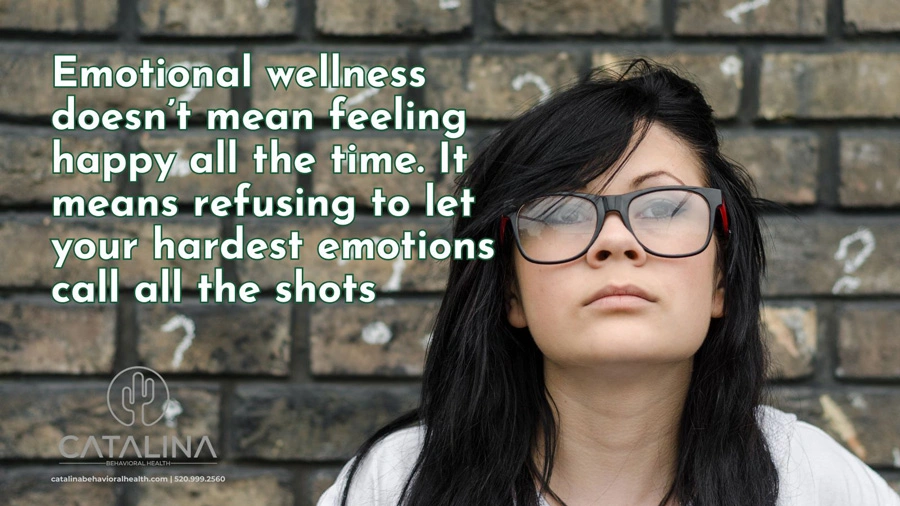Learn About a 12-Step Program for Emotional Well-Being
A recent client described the inner turmoil of her emotional difficulties as a dozen or more browser tabs open inside her brain. One of the pages was playing annoying music, but she couldn’t find the media player to shut it off. Anxiety was an open tab, past trauma was an open tab, and depression was slowly loading in the background.
Each tab represented an emotion that was near the surface and contributed to mental overload. Emotions Anonymous is a program that can help such people process these feelings in a healthy, safe environment.
But what is Emotions Anonymous all about?
Emotions Anonymous helps its members focus on overcoming emotional illnesses following the famous AA 12-step program model. The Catalina Behavioral Health team recommends that people who struggle with alcohol and drug abuse find a local 12-step group.
We also suggest that people with emotional problems without addiction issues find twelve-step groups to increase self-efficacy after leaving our mental health program.
Our JCAHO-accredited treatment center in Tucson, Arizona, has helped countless people find greater emotional stability and become more self-supporting. Emotions Anonymous International is another resource that may be helpful to you. Continue reading to discover how EA programs can promote better mental health.
Get Effective Trauma Treatment Options – Reach Out Now!
Emotions Anonymous International Provides Community-based Support
The first EA program was the Minnesota Intergroup Association, founded in St. Paul, Minnesota, in 1971. The founders recognized how emotional illness or pain can be just as debilitating as drug or alcohol addiction, but didn’t have a 12-step framework for people to follow.
They followed the Alcoholics Anonymous 12-step model to provide support for those facing challenges with anxiety, depression, anger, grief, low self-esteem, and unmanaged daily stress.
Alcoholics Anonymous World Services Agreed to Adapt Their Program
AA agreed that an unmet need was present. Giving a person support for their emotional issues before they turned to substance abuse was a great idea, and AA permitted the founders of Emotions Anonymous to use their effective concept.
Emotions Anonymous would receive permission to adapt and reprint the 12 Steps and 12 Traditions – key literature of the Alcoholics Anonymous twelve-step program.
Emotions Anonymous Focuses on a Recovery Process for Emotional Issues
The agreement allowed Emotions Anonymous to heavily rely on proven AA principles while creating its distinct program.
While AA would continue to help admitted alcoholics with its program and literature, EA members would receive a message of better emotional wellness.
The Twelve Steps of the Emotions Anonymous Fellowship

The 12 Steps of Emotions Anonymous are directly adapted from AA and reprinted with permission of Alcoholics Anonymous World Services. Copies of EA’s adaptations can be found in the “Yellow Pamphlet,” which can be downloaded for free on the EA website.
Here’s our summary of the twelve steps:
- In the first step, we admitted we were powerless over our emotions—that our lives had become unmanageable.
- Came to believe that a Power greater than ourselves could restore us to sanity.
- Decided to turn our will and our lives over to the care of God as we understood Him.
- Made a searching and fearless moral inventory of ourselves.
- Admitted to God, to ourselves, and to another human being the exact nature of our wrongs.
- Were entirely ready to have God remove all these defects of character.
- Humbly asked Him to remove our shortcomings.
- Made a list of all persons we had harmed and became willing to make amends to them all.
- Made direct amends to such people wherever possible, except when to do so would injure them or others.
- Continued to take personal inventory, and when we were wrong, promptly admitted it.
- Sought through prayer and meditation to improve our conscious contact with God as we understood Him, praying only for knowledge of His intentions for us and the will and power to carry that out.
- These steps resulted in a spiritual awakening. We strive to convey this message to others and apply these principles in all our endeavors.
Finding Emotions Anonymous Meeting Details
The biggest drawback of the EA program is finding a meeting. While Alcoholics Anonymous members have hundreds of meetings to attend, EA offers fewer.
While Tucson itself does not currently have any in-person meetings, EA does hold a weekly meeting nearby in Benson each Wednesday evening (find details here).
Emotions Anonymous also has a robust online platform, open to all Arizonans. Some meetings are online only, and some may be combined with other groups that have an in-person presence.
Emotions Anonymous International Services provides a comprehensive list of all online meetings in this document.
Who Benefits from Attending EA Meetings?

You understand that EA will be hard work: taking a moral inventory, learning the exact nature of contributing factors, and asking God to remove defects will be challenging. So now you might wonder if EA will benefit your life. EA helps anyone who struggles to overcome difficult emotions. You don’t need to have a formal diagnosis; you need to desire to make a change, but haven’t been able to do so alone.
Here are some behavioral archetypes of people who benefit from EA:
The Compulsive Reactor
Even the smallest triggers set off rage, shame, or guilt – it’s become a compulsive behavior. You may not always realize it when you act out, but you later regret how your overreactions drive people away. Your powerlessness over these shortcomings leaves you feeling constantly out of control of your life.
The Trauma Survivor
You’ve gone through a severe loss or a series of emotional injuries in life. The trauma you’ve faced and suppressed has warped your worldview and destroyed your trust. EA allows members to examine trauma at their own pace and learn to protect themselves. Dealing with the trauma will offer you fresh hope.
The Lonely Struggler
You might have difficulty relating to others and feel powerless, as if you’re the only person struggling emotionally. As meetings become more familiar, you will connect with other members of the 12-step group, people who rely on a power greater than themselves to overcome loneliness and form a fellowship.
The Emotionally Numb or Disconnected

The world has hurt you, and you’ve responded by shutting down. But now you find yourself unable to reconnect. You go through the motions of daily life without joy. The EA meeting is a safe place to turn the page on the numbness and feel whole and connected again.
The process of making conscious contact with a Higher Power, whom you have humbly asked for help, helps you reconnect with your inner self.
The above archetypes are just a starting point. Anyone who wants to grow and increase their emotional security is welcome. You don’t need to hit emotional rock bottom to feel welcomed by the group.
Up To 100% of Rehab Costs Covered By Insurance
Dealing with Emotional Distress? Contact Catalina for Safe Treatment
If you have tried self-help programs like Emotions Anonymous or Neurotics Anonymous with only minimal steps toward recovery, you are not alone. Many group members have mental health and emotional illnesses that are too profound to be addressed in a 12-step group setting. It’s one thing to want to examine all our affairs and take a fearless moral inventory.
However, it’s an entirely different matter to tally up all these defects and make direct amends without comprehensive one-on-one support. It’s just not possible for every person.
Recognizing the need for professional recovery means you are ready to take the necessary steps toward overcoming feelings of powerlessness and learning practical coping tools to manage your life. Call Catalina today for an initial assessment. Give us the word – we can help you shut off all those open browser tabs and enjoy a peaceful life.





